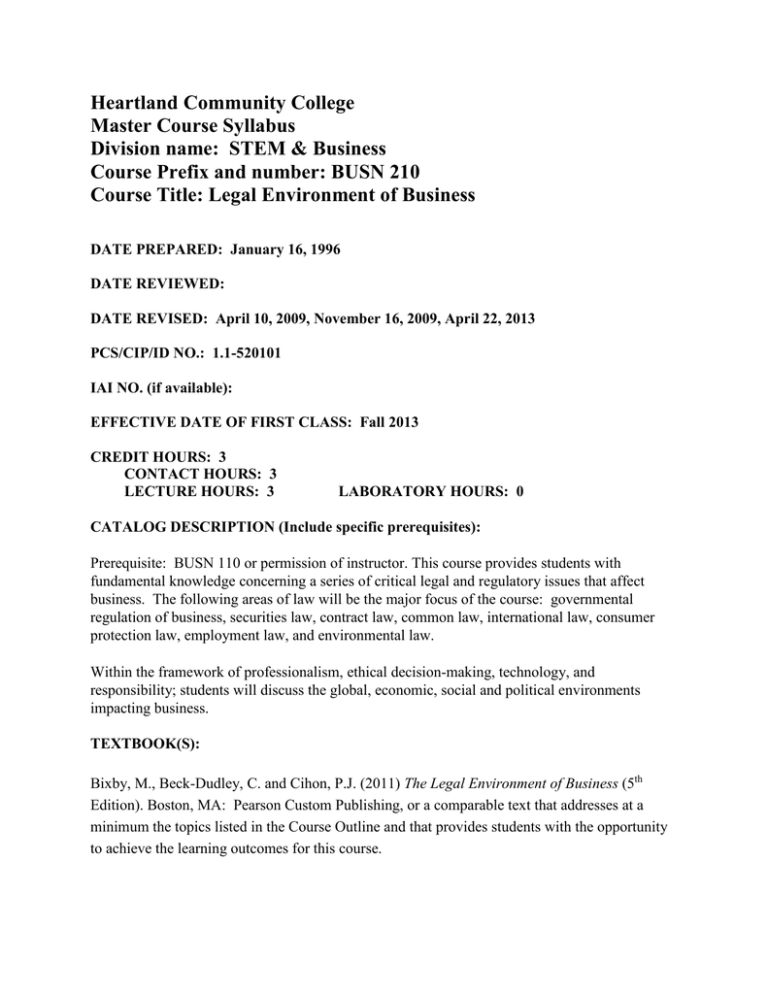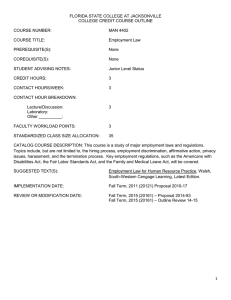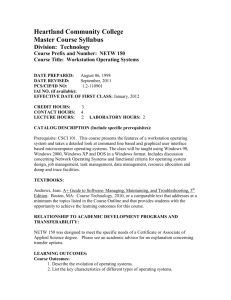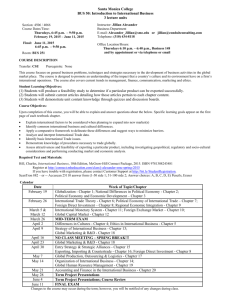BUSN210_Apr2013 - Heartland Community College
advertisement

Heartland Community College Master Course Syllabus Division name: STEM & Business Course Prefix and number: BUSN 210 Course Title: Legal Environment of Business DATE PREPARED: January 16, 1996 DATE REVIEWED: DATE REVISED: April 10, 2009, November 16, 2009, April 22, 2013 PCS/CIP/ID NO.: 1.1-520101 IAI NO. (if available): EFFECTIVE DATE OF FIRST CLASS: Fall 2013 CREDIT HOURS: 3 CONTACT HOURS: 3 LECTURE HOURS: 3 LABORATORY HOURS: 0 CATALOG DESCRIPTION (Include specific prerequisites): Prerequisite: BUSN 110 or permission of instructor. This course provides students with fundamental knowledge concerning a series of critical legal and regulatory issues that affect business. The following areas of law will be the major focus of the course: governmental regulation of business, securities law, contract law, common law, international law, consumer protection law, employment law, and environmental law. Within the framework of professionalism, ethical decision-making, technology, and responsibility; students will discuss the global, economic, social and political environments impacting business. TEXTBOOK(S): Bixby, M., Beck-Dudley, C. and Cihon, P.J. (2011) The Legal Environment of Business (5th Edition). Boston, MA: Pearson Custom Publishing, or a comparable text that addresses at a minimum the topics listed in the Course Outline and that provides students with the opportunity to achieve the learning outcomes for this course. RELATIONSHIP TO ACADEMIC DEVELOPMENT PROGRAMS AND TRANSFERABILITY: BUSN 210 Legal Environment of Business fulfills 3 semester hours of elective credit for the A.A. and A.S. degrees. It should transfer to most colleges and universities as an elective course. However, since this course is not part of either the General Education Core Curriculum or a baccalaureate major program described in the Illinois Articulation Initiative, students should check with an academic advisor for information about its transferability to other institutions. COURSE OBJECTIVES (Learning Outcomes): Upon completion of this course the student will be able to: Outcomes 1. Identify the sources of law in the United States. 2. Compare and contrast ethical considerations with legal requirements. 3. Identify important legal issues in Securities Law. 4. Discuss key issues in Tort Law. 5. Outline the principles of contract law. 6. Debate important issues in Environmental Law. 7. Discuss global business issues relating to Intellectual Property Law. 8. Compare legal issues relating to Consumer Protection. 9. Discuss compliance requirements in Employment Law. General Range of Assessment Methods Education Outcomes Writing assignments, exams, presentations, discussions, quizzes CT 2 Writing assignments, exams, DI 3 presentations, discussions, quizzes PS 3 Writing assignments, exams, presentations, discussions, quizzes CO1 Writing assignments, exams, CT2 presentations, discussions, quizzes Writing assignments, exams, presentations, discussions, quizzes CT 2 Writing assignments, presentations, discussions DI 2 Writing assignments, exams, DI 3 presentations, discussions, quizzes DI 4 CO1 CT1 Writing assignments, exams, presentations, discussions, quizzes CO1 Writing assignments, exams, presentations, discussions, quizzes COURSE/LAB OUTLINE: 1. 2. 3. 4. Legal System in the United States International Law Business Ethics and Corporate Social Responsibility Securities Law 5. 6. 7. 8. 9. 10. Contract Law Tort Law Legal Issues Involving Consumer Protection Employer/Employee Legal Issues Environmental Law Intellectual Property Law METHOD OF EVALUATION (Tests/Exams, Grading System): The final grade in this course will be determined by the total points earned through completion of selected activities from the following: Minimum – Maximum Writing Assignments Exams Participation and/or Discussions Quizzes Presentations 25% - 50% 20% - 50% 20% - 30% 10% - 20% 0% - 30% Letter grades will be based on the percentage of points earned in the course in accordance with following scale: A B C D F 90% - 100% 80% - 89% 70% - 79% 60% - 69% 0% - 59% REQUIRED WRITING AND READING: Students are assigned approximately 40 pages of reading each week*. Reading comes from the textbook, articles, and reference materials as indicated in the Course Calendar. A minimum of ten pages of college level writing is required in this course. All written assignments are designed to enhance the student’s writing skills and critical thinking skills by analyzing concepts discussed in the course. *estimate is based on a 16 week course schedule. Please note if your class is not a 16 week class your weekly reading assignment will be increased.








